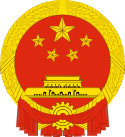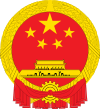- Standing Committee of the National People's Congress
-
People's Republic of China 
This article is part of the series:
Politics and government of
the People's Republic of ChinaIdeology- Leadership of China
- Constitutional history
- National People's Congress
- NPC Standing Committee
- NPCSC Chairman: Wu Bangguo
- President: Hu Jintao
- State Council (Central People's Government)
- Premier: Wen Jiabao
- Vice Premiers
- 1st ranking: Li Keqiang
- State Councilors
- Vice Premiers
- Premier: Wen Jiabao
- PRC Central Military Commission
- Supreme People's Court
- President: Wang Shengjun
- Supreme People's Procuratorate
- Procurator-General: Cao Jianming
- NPC Standing Committee
- Political Consultative Conference
- National Committee
- Minor political parties
Other issues
The Standing Committee of the National People's Congress (NPCSC; simplified Chinese: 全国人民代表大会常务委员会; traditional Chinese: 全國人民代表大會常務委員會; pinyin: Quánguó Rénmín Dàibiǎo Dàhuì Chángwù Wěiyuánhuì) is a committee of about 150 members of the National People's Congress (NPC) of the People's Republic of China (PRC), which is convened between plenary sessions of the NPC. It has the constitutional authority to modify legislation within limits set by the NPC, and thus acts as a de facto legislative body. It is led by a Chairman, China's top legislator, who is conventionally ranked third in China's political ranking system, after the General Secretary and President, which is usually one person. The current Chairman is Wu Bangguo.
The NPCSC also has the power to interpret the laws of the PRC, including its constitution. In contrast to other countries in which stare decisis gives the power of both final interpretation and adjudication to a supreme court, within the People's Republic of China constitutional and legal interpretation is considered to be a legislative activity rather than a judicial one, and the functions are split so that the NPCSC provides legal interpretations while the Supreme People's Court and the Court of Final Appeal of the Hong Kong Special Administrative Region actually decide cases. Because an interpretation of the NPCSC is legislative in nature and not judicial, it does not affect cases which have already been decided.
A notable use of the latter power occurred in 1999 during the dispute of the Right of Abode issue in the Hong Kong Special Administrative Region. In the case, the NPCSC interpreted the Basic Law of Hong Kong in accordance with the position taken by the Hong Kong government with respect to the eligibility of permanent residency in Hong Kong.
Leading members
- Chairman (Speaker):
- Vice Chairpersons:
- Wang Zhaoguo
- Lu Yongxiang
- Uyunqimg
- Han Qide
- Hua Jianmin
- Chen Zhili
- Zhou Tienong
- Li Jianguo
- Ismail Tiliwaldi
- Jiang Shusheng
- Chen Changzhi
- Yan Junqi
- Sang Guowei
Chairmen of the Standing Committee
Main article: Chairmen of the Standing Committee of the National People's CongressThe Chairman of the NPC is the presiding officer of the legislative body, a position that is similar but not entirely analogous to that of a speaker of congress.
See also
- Presidium of the Supreme Soviet, a Soviet Union institution, after which Standing Committee of the NPC was modelled.
 The Central State Organs of the People's Republic of China
The Central State Organs of the People's Republic of ChinaNational People's Congress NPC Standing Committee President State Council Central Military Commission Supreme People's Court Supreme People's Procuratorate 
National People's Congress 1st–9th (1954–2002) 
10th (2003–2007) 1st Plenary Session (2003) · 2nd Plenary Session (2004) · 3rd Plenary Session (2005) · 4th Plenary Session (2006) · 5th Plenary Session (2007)
11th (2008–2012) 1st Plenary Session (2008) · 2nd Plenary Session (2009) · 3rd Plenary Session (2010) · 4th Plenary Session (2011) · 5th Plenary Session (2012)
Categories:
Wikimedia Foundation. 2010.
